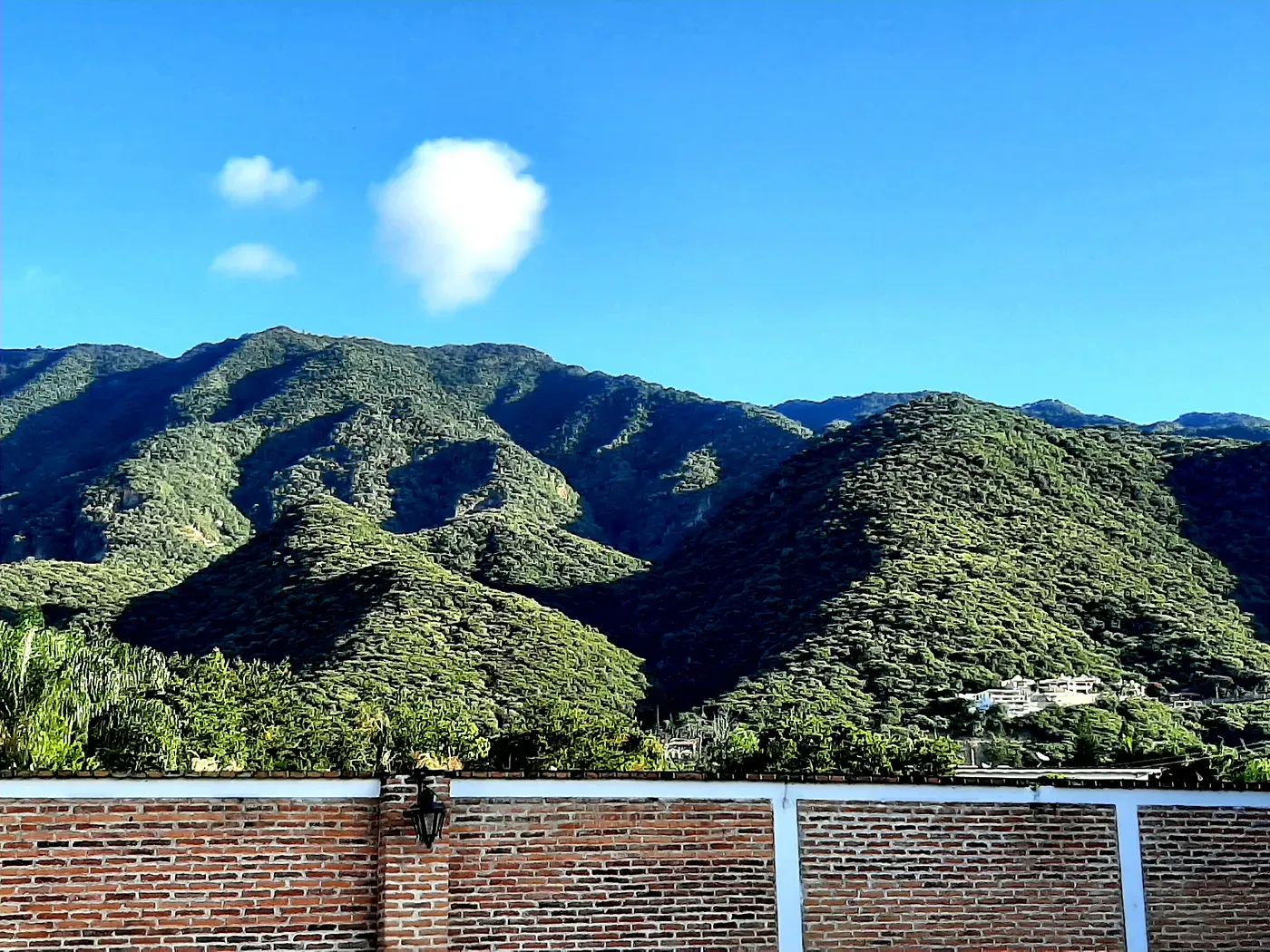Mexico Is Inhospitable to My Autistic Self
If I’d understood my own disabilities, I might not have made the move

At the age of forty-nine, I learned a lot of paradigm-shattering things about my brain: I am Autistic and ADHD-inattentive, I have Sensory Processing Disorder and Central Auditory Processing Disorder, I’m hyperlexic but hypophantasic, I have mild dyspraxia and a visual-spatial learning disorder. All of these things have been true my entire life, but it took me almost five decades to identify them and begin to understand what they mean for me.
By that time, I (an American) had already been living in Mexico for six years, and they had been hard years, so much harder than I had expected going in.
People have been telling me how ‘smart’ and ‘gifted’ I am at least since I was two years old. Their expectations of me — and very often, the expectations I placed on myself — were essentially perfection, top-tier excellence in every aspect of life. But those expectations all sprang from a baseline of what was considered ‘average’ and ‘normal’ … for the neurotypical majority.
Hyperlexia meant I taught myself to read at the age of two. I am gifted when it comes to words and language. But no one considered that this wasn’t a universal advantage, that I might also have differences and deficits and disabilities.
My basic needs have always been different from ‘normal’. The fact that those needs went unrecognized and unmet — by myself and everyone around me — did not mean they ceased to exist. It only meant that almost everything in my life was more difficult … and that therefore I almost always failed to meet my own expectations, much less anyone else’s.
All of this was compounded enormously when my partner and I picked up and moved to a foreign country. This essay explains many of the ways in which things were much more difficult than I expected … and also how I’m coping, and why we are still here.
Strangeness
Lacking ‘autism’ as a context, I did not recognize how much of my ability to cope with the world is dependent upon familiarity. I’d moved around the United States a number of times, a process which I found stressful and difficult but surmountable, and I overestimated how much those experiences would have in common with moving to Mexico.
In Mexico — at least in the part of central Mexico we moved to — everything operates differently. Very few of my most basic assumptions about how to go about life remained applicable. Many items that are common in the United States simply are not available here (or, because this is an expat enclave, occasionally can be purchased at three to five times the American price, which in our case comes to the same thing). Some things that are available must be acquired in a completely different way from any system I’ve ever lived under.
Here’s an example, one that I am dealing with for the first time right now, and so am still kind of feeling my way through: we have a new window that needs curtains and a curtain rod. In America the window would be one of several standard sizes, and there are any number of stores that I could find online (or visit in person if I preferred) which would carry a wide array of premade curtains in a wide selection of different fabrics, as well as adjustable curtain rods in a variety of materials and styles. I could spend a couple of hours clicking around online and make a purchase and stuff would show up in a few days. (Thirty years ago I would have had to go in person to a mall and look through a couple of department stores and load them into a car, but the basic process was very similar.)

But here in small-town Mexico, even in the 2020s, many more things are only manufactured to order. We didn’t buy a premade window from a big hardware store, we had to contact a glass and aluminum worker and specify the dimensions we wanted. Similarly, in order to get a curtain rod, I’m probably going to have to ask around in expat forums for recommendations for an ironworker, visit him in person and find out from him (in Spanish) what my design options are, and place a special order for a rod to be made. Then (because I don’t have a sewing machine) I’m going to have go through the same process to find a seamstress who can sew custom curtains for me. I’ll probably have to find a photo online that looks like what I want, and ask if that’s something she can make.
Assuming the answer is yes, I then have to source my fabric, which means I need to research how curtains are made, and how much extra fabric is necessary to account for hemming and pleats and so on, then do that math. And then I have to find a place to buy fabric! Because no, there isn’t just a JoAnn’s down the road that I could drive to. But this is where nine years of reading expat forums and mailing lists comes in handy: I remember seeing something go by some years ago about a fabric warehouse, maybe on the road between here and the Guadalajara airport? I’ll have to chase that down — or ask around again — and who knows what kind of crazy situation I’ll have to deal with when I actually get there?
Now imagine that kind of process playing out for each separate thing you need. Add in governmental bureaucracy (and corruption) that exceeds in both complexity and rigidity the worst situation you’ll ever experience at an American DMV. Then take away half of the infrastructure most people in America take for granted — smooth roads, functioning traffic lights, reliable electricity, clean drinkable water, sewer systems that can handle flushed toilet paper, and so on.[1]
Businesses in Mexico rarely have web pages — nor is there even an old-school phone book, so it’s not like I can just revert to operating like it’s 1980s America. Stores close in the middle of the afternoon, and not infrequently just randomly decide to ignore their own posted hours. Buildings don’t have numbers at all, or they have numbers assigned completely at random. There are rarely street signs, and streets change names with no warning.
And another thousand daily differences and difficulties beyond that. All of it adds up to a level of uncertainty that is Autistic/ADHD hell. I’m sure if I’d grown up in Mexico, watching adults around me navigate these things for all of childhood before they became my responsibility, I would have managed fine — or at least as well as I do in the United States.
But coming in as an adult was ridiculously confounding and laborious. I spent the first two years completely overwhelmed by trying to figure out how to execute the most basic life tasks. Slowly, over these nine years, my partner Jak and I have built a knowledge base of how things operate, but (as the example above shows) there are still many holes in it.
Language
When we decided to move to Mexico, I didn’t know more than a couple dozen words in Spanish. I wasn’t fazed by this at the time. I thought of myself as highly intelligent, remember, so I figured teaching myself a new language would be no big deal.
I didn’t know I should be factoring in Central Auditory Processing Disorder, a condition related to and highly co-occurring with SPD and Autism. It’s not a hearing deficit, it’s a difficulty with how the brain makes sense of the information that the ears are passing along. CAPD explains why the phrase “sorry, what?” is the constant mantra of my life, why I never wanted anyone to read aloud to me, why I can’t understand people if their mouths aren’t visible for me to lipread, why I require subtitles to follow media in my native English, and many other ‘quirks’ throughout my life.
Turns out that when I’m listening to a spoken language, I’m doing a lot more work behind the scenes than most people: I have to take the vague pieces that make it to my brain and compare them against a vast database of possible word combinations until I come up with a sensible result — all in real time, while still monitoring and queueing the fuzzy fragments of the next part of what’s being said.
Needless to say, I don’t have the same experiential database of possible sound and meaning combinations in a foreign language, nor is it the sort of thing that a few years of study can produce. I found that I did pretty well at picking up written Spanish, but as soon as anyone spoke at anything like a normal speed, my brain stalled out. It doesn’t help that verbal Spanish is really fast — one study clocked it at 7.82 syllables per second, compared with 6.19 syllables for English. Among major world languages, only Japanese is faster.
So late-acquired fluency in any spoken language is not a walk around the block, for me — it’s a decades-long cross-country marathon if it’s even achievable at all.
Culture
My natural style of communication is, it turns out, classically autistic.
I don’t demur or dissemble: I say only and exactly what I mean, choosing my words with exacting precision. ‘Small talk’ seems confusing and pointless to me; I almost never think to initiate it, and am deeply uncomfortable when I have to respond to it. I am forthright and direct in a way that allistics (non-autistics) often perceive as ‘blunt’ and occasionally even ‘rude’. I am prone to stating facts without even imagining that doing so might make someone uncomfortable.
There’s an anthropological concept, developed by Edward Hall in 1976, that I think is highly relevant: ‘high-context vs. low-context cultures’. From Wikipedia:
High-context cultures are related to connotation. People within high-context cultures tend to be more aware and observant of facial expressions, body language, changes in tone, and other aspects of communication that are not directly spoken. Denotation tends to be attributed to low-context culture. People in low-context cultures communicate in a more direct way, with explicitly speaking what they want to communicate.
I suggest that Autistics are innately suited to low-context communication. Those of us who speak are typically quite adept at explicitly saying what we mean … but we tend to eschew phatic communication. Many of us have difficulty correctly interpreting allistic body language and facial expressions, and do not naturally arrange our own bodies and faces in ways that match allistic expectations. All of these things are more important in high-context cultures.
Among world cultures, the United States is considered relatively low-context. Mexico, like all of Latin America, is very high-context. For example, small talk is more of a thing in Mexican culture than in the dominant American one — by Mexican standards, even ordinary non-autistic Americans come off as rude.
I’ve seen several Autistic expats say that they are more comfortable in a foreign country, because as foreigners they are judged by less rigorous social standards than in their home country. But I have to wonder how much of that is only true because they moved to a country with an equal or lower-context culture than their home country.
Because increased comfort is not an experience that I’ve had. I don’t have any way to judge whether Mexicans’ expectations of me are more lax, but I am certainly no less anxious about interactions than I am with Americans. More, in fact, because Mexican interactions come with the extra stress of trying to speak and understand a language in which I am neither fluent nor comfortable, in the context of a culture to which I will always be an outsider. And because I am aware that all the ways of communication in which I am least capable are the ones that matter most here.
There are two other cultural stumbling blocks that I knew about in advance but didn’t fully realize how significant they would turn out to be. One, that I am an atheist while Mexico’s population is still predominantly devout Catholic (with a side order of Evangelical). Two, that almost everything in Mexico is organized around family relationships, and I don’t really have (or in some ways, even understand) that kind of ‘family’.
My family-of-origin was extremely small (no siblings, very few cousins) and also very shitty, and I’m estranged from most of them and have barely met the rest, the sole exception being an elderly aunt who no longer travels. I ended up step-parenting my partner Jak’s two daughters, but I never wanted children of my own, a fact which Mexican women tend to meet with incredulity and incomprehension.
I would have liked a larger ‘chosen family’, but it hasn’t worked out that way. My partner Jak is my family, and for everything else I have friends.
Old Friends
I joined my first online community in the fall of 1992, when I was twenty-two years old. I took to it like a fish to water; that community changed my life very much for the better, and that experience solidified my nascent belief that distance should be no barrier to friendship.
Making friends was never something that came easy to me. Like almost all autistic children, I was badly bullied and rejected throughout my childhood. At thirteen I began consciously trying to remake myself into someone more likable, a process which I now recognize included learning to mask many of my autistic traits and compensate for the ways in which my social brain is wired differently. (In hindsight, this was definitely a double-edged sword.)
But it was a successful enough effort that within about two years, at age fifteen, I had managed to make my first real friends. Yet because as a young adult I kept graduating and/or moving to new cities every couple of years, I kept having to start over from the beginning with new people … and while I then found it possible to make new friends, I never achieved easy.
Now, thirty-plus years later, despite having had some terrific long-distance relationships, I cannot deny the fact that physical distance matters a great deal. I always tried to stay close with friends after one of us moved away, and often succeeded for a number of years, but over time almost all of them fell apart. Sometimes, too, I’ve lost an emotionally close but physically distant friend over a situation that I suspect could have been resolved if we’d been talking in person — if ghosting the friendship hadn’t been such an easy path to take.
By the time we moved to Mexico in 2013, I had lived in the same city (Seattle) for fifteen consecutive years, and I had a handful of local-ish people I considered very close friends and also the benefit of a larger community of speculative fiction writers in the Pacific Northwest (mainly Washington and Oregon). But even the people I was emotionally closest to were very busy, so that despite living no more than an hour’s drive away, I might actually see them only two or three times a year.
From there it didn’t seem like such a large leap to seeing them once every year or two. Before we left for Mexico, I made budgets and plans around the idea that I would travel back to the U.S. every year — even years to NYC and odd years to Seattle — to visit my friends on each coast. Plus, I thought, some of my friends would come visit me — who wouldn’t want a Mexican vacation with free lodging?
Turns out there were several gigantic errors in my thinking:
One, available evidence leads me to suspect I was wrong and there actually is a pretty big difference between once every four to six months and once every two years. The idea of biennial in-person visits was always predicated upon having communication of some sort between times; in my twenties (the 1990s) my closest long-distance friends and I would either spend hours on the phone, or exchange lengthy letters (later emails), every week or two at most. My experience over the last nine years has been that almost no one is willing or able to do those things now — and I don’t think that could be simply because none of the people I thought were my friends post-2000 actually cared much about me. Rather I suspect it must be some combination of a) the increased responsibilities weighing on people in their thirties through fifties, and b) some of the ways the world has changed, economically and technologically, over the last two decades.
Two, my ignorance of my own autism led me, once again, to place unreasonable expectations on myself. I discovered during my calamitous first trip back to Seattle in 2015 that solo travel is not safe for me. I don’t always need a support person (and in fact I always pre-plan things in excruciating detail in order to avoid exactly that), but if something goes very wrong and I don’t have anyone to help me, the failure cascade is catastrophic. Right now there are only two people — my partner Jak, and one particular friend — whom I can trust to be that support person, so I will not be traveling anywhere unless one of them is with me.
Three, I failed to consider other future changes that might make those yearly trips impossible. Changes like the paralyzing autoimmune disease that hit me in 2016 and permanently reduced my mobility and functionality. Or a global unending pandemic that even now, two and a half years on, has both drastically curtailed available transportation and greatly increased personal risk.
Four, it turns out people aren’t nearly as interested in vacationing in Mexico as Jak and I assumed they would be. Only two friends came to visit in the six-plus years we were here pre-pandemic, and typically not because they couldn’t afford it. Some of Jak’s family have made the trip a couple of times, but even that has happened much less than he’d expected. He and I have puzzled over this many times, and we still aren’t sure we understand. Do people think (erroneously) that Mexico is more dangerous than America? Is there a psychological hurdle to flights that cross a country border? We just don’t know, but the trend is clear.
New Friends
I came to Mexico expecting that I could eventually make new local friends with both expats (who are primarily Canadians and Americans, here) and Mexicans. I knew that to do the latter I’d have to surmount both the language barrier and the cultural barrier, and as I explained above, I underestimated how difficult both of those things would be.
After we’d lived here a couple of years it also became clear that class and education differences create yet another barrier. We live in a small town about an hour from Guadalajara, and the Mexicans who live here are mostly poor and working-class. Many of them do not fully graduate the equivalent of high school. I, on the other hand, am middle-class and college-educated, and an autodidact besides.
Jak likes to play soccer, and pre-pandemic he joined a local soccer team and made some Mexican ‘activity buddies’ that way. I had no such equivalent, nor did I want one. That’s another of my lifelong traits which turns out to be autistic: I have no use for ‘activity buddies’ and only limited interest in other casual friendships. Autistics tend to find socializing exhausting, and it’s only worth the energy when we find the relationship itself rewarding. For me that means deep conversations, ones that are intellectually interesting or emotionally personal.
Possibly things would have gone differently if we could have moved to a more urban and cosmopolitan area of Mexico (the one Mexican I do consider a friend, and with whom I do have things in common, lives in Mexico City) … but that was out of our financial reach.
So that left me with other immigrants. Now, our little string of towns is one of two big expat magnets in Mexico, so there are at least theoretically a lot of options. But Jak and I, moving here in our forties, were about twenty-five or thirty years younger than the average expat, and we didn’t (and still don’t) have anything like the kind of free time that all the retired people did.
And, of course, I’m still autistic, which means a high percentage of neurotypical people find my manner off-putting. It took me six years of living here before I felt like I’d gotten a foot in the door to real friendships with any other expats … and in the year after that, Covid hit and blew everything up.
Big Bangs
Mexican culture is generally loud: people regularly talk and play music here at volumes that I rarely experienced in the United States. Mexican celebrations are frequent, large, and blast the neighborhood until the wee hours, and if you live in a town or city you will probably be awakened by the occasional brass band serenade at five in the morning. Also here I learned that rooster crowing is not even remotely dawn-limited, but is a 24-hour phenomenon.
But loud music blaring for blocks is nothing compared to the skyrockets. The Mexican word for them is ‘cohetes’, and they are all sound, no light. They are much louder than the kind of fireworks that produce visual displays, and they are usually much closer. Worse, because there is zero regulation — anyone and everyone can use them at any time or place — there is no anticipating the next wall-vibrating explosion. On certain festival days they may go off several times a minute for hours in a row, or dozens of times an hour for a full twenty-four.
Cohetes are distinctly unpopular among gringos of all neurotypes, and some Mexicans dislike them also. But it’s not merely an unpleasantness or a nuisance for me: noises that are far less aggressive than cohetes cause me intense physical pain; the cohetes produce a level of distress that completely locks up my ability to think straight, and the most unrelenting barrages will send me into total meltdown.
I knew I had a problem with loud noises before we moved here, of course — it’s not the sort of thing you can miss about yourself — but I assumed it was a symptom of my C-PTSD. Which meant that I still had a mindset of ‘getting over’ the problem someday. Once I discovered the concept of Sensory Processing Disorder, though, everything made a lot more sense. I am literally hyper-sensitive and again, it’s not my ears (or eyes, or nose); it’s the way my brain is fundamentally wired, and no amount of exposure or ‘healing from trauma’ will ever alter my hyperacusis.
Bumpity Bumps
As a general rule, public roads in Mexico are in far worse shape than comparable roads in the United States. Plus, in our particular small town, all the roads except the one main thoroughfare are rough, poorly maintained cobblestone. (I’ve seen pictures of cobblestone roads that are almost flat, but this is not that — the roads here are as bumpy as any dirt road I’ve ever been down, and just as full of ruts and holes.)
Also, the low level of governmental services here means that there are no uniform sidewalks — the walkable area in front of buildings is maintained, or not, by the owner of the building. For similar reasons, street lights such as you typically find in residential America are rarely a thing here. So simply walking down a street is an obstacle course.
What does this have to do with autism? Well, Sensory Processing Disorder is a component of autism, and my particular sensory profile includes a proprioceptive deficit, meaning I don’t have a good sense of where the edges of my body are. I can walk a flat surface as well as anyone, but if there are any irregularities beneath my feet I will trip and fall unless I watch each foot as I place it.
This means that walking here is difficult for me in the daytime (and no fun, because I cannot look at anything other than my own feet) and downright hazardous at night.
I also find the experience of driving on these rough roads much more unpleasant than anyone else I know. Like, I don’t think anyone is really a fan, but my distress level is so high that it tends to push me in the direction of either anger or tears. (As long as the road is the only source of distress, I can control my outward reaction, but if I’m already overloaded, look out.)
Have you ever been at the edge of sleep, and you dream of falling, so that you jerk awake? You know that sort of stomach-dropping disorientation? Now imagine that happening over and over again, about twice per second. That’s approximately what driving over a cobblestone road is like for me.
I suspect that my poor proprioception means that my brain isn’t able to compensate for the random, rapid jarring in the same way that most people’s brains can. Or perhaps I have a vestibular sensory deficit also, which is causing the issue.

Coping
So with all of these problems, why are we still here?
Bluntly, because we can’t afford to live in the United States. And while part of that is due to the same terrible American political and economic policies that have kept almost everyone I know struggling, part of it is also because I’m Autistic.
Like a majority of Autistic people, I have found maintaining consistent employment completely impossible. I was smart enough to teach myself enough of software and coding and design to break into the young tech industry without benefit of formal training, and I learned to mask my neurodivergence well enough over short periods — like, during interviews — that I could land a corporate job (except in years when the employment market crashed, in which case I would be out of luck).
But performing neurotypical was never sustainable for nine or ten hours a day, five days a week, month after month. Inevitably I would break some unspoken rule, or lose some game of office politics that I didn’t even realize was being played, and then I’d be kicked to the curb. Or I would be working so hard that I’d go into full autistic burnout, and start to fail at my actual job, and get fired for that.
Because I spent approximately half of my adult life unemployed, the money I did make had to stretch twice as far. When we left the United States, I was forty-three, I had been job-hunting for just shy of two solid years, and it was starting to look like my career was over. The farther I got into middle age, the more obvious it became that my employability in my twenties and thirties had been significantly enhanced by being a Pretty Young Thing. By my forties, I didn’t have that privilege anymore. Nor did I have much in the way of retirement savings. What I had instead was a moth-eaten resumé, half a lifetime of accumulated anger, and relentless exhaustion at a level that no healthy allistic person can comprehend.
My partner Jak, being not just allistic but also white and male, has always had a much easier time on the employment front, but in order for his income to carry us and make up for lost time in retirement savings, we had to slash our living expenses dramatically. And while there might have been a few small towns in Middle America that were cheap enough, they were not places where we — a pair of atheist polyamorous queer progressive democratic socialists — would be any more likely to find friends or community or even local employment.
I’ve run the numbers on moving back many times, and every time the answer comes back as a giant Nope: if we did, we’d be setting ourselves up to run out of money just when we were most vulnerable. About six years ago, things got more complicated when I developed an autoimmune disease that destroyed many of the nerves in my brachial plexus, leaving me permanently semi-paralyzed in both shoulders. At that point we hired a housekeeper to help clean several hours per week, the way almost all expats (and middle-class Mexicans) here do. Because of my physical disability, I depend hugely upon this help, which we would not be able to afford in America.
Four years ago we went all-in on Mexico — bought a little house and started saving money to improve it. In the process, we were able to reduce the noise levels by moving farther away from the center of town, even though doing so made some other aspects of daily life more difficult. To cope with the rest, I bought a pair of high-quality active-noise-cancelling headphones, ones comfortable enough that I can stand to wear them all day if I must.
If it hadn’t been for the pandemic, I might even have a couple of close local friends by now. I do at least know where to find good candidates, if and when it ever becomes reasonably safe for me to breathe other people’s air again: the local English-language Unitarian Universalist fellowship was an extremely welcoming community with many like-minded people, some of whom are still casual friends even though we’ve hardly seen them in the last two-and-a-half years.
A few things have gotten easier on their own: Amazon moved into Mexico and has been expanding its service in the several years since. Walmart started offering online grocery ordering and delivery in 2020, just in time for the pandemic. (I hate that I have to make use of these things, but a drowning person doesn’t have the luxury of rejecting a life raft because she objects to the practices of the only company that makes them. Lately I’ve been donating to Amazon Labor Union in penance.)
The electricity has improved; it goes out briefly probably a couple times per week but it’s more rare that we lose power for hours at a time. Internet access was pretty awful for the first five years or so, but then a bunch of expats got together and pledged prepayments to bring a fiber optic company to the area, so now we have decent internet that’s … well, about as reliable as the electricity.
We’re both in our fifties now — Jak is within shouting distance of sixty — and we expect to be here for at least another dozen years. If, when I get close to sixty-five, Medicare still exists and America isn’t (even more of) a fascist totalitarian state, I’ll run the numbers again. But there’s also a chance that we’ll be Mexican residents for as long as we’re both alive.
If I’d known all these things before we moved, or even within the first couple of years after, there’s a good chance we’d have chosen a small town somewhere in Middle America instead, politics and all. But that didn’t happen, and so we’re here, and every year that passes, some things get a little bit easier. There are always trade-offs, and some things about my life now are quite nice. I’m okay with this being the road we took.
I am aware that this expectation of infrastructure support does not pertain to people in Flint, Jackson, or any number of other poor, often Black and Indigenous communities, who have been broadly left out of ‘American prosperity’. ↩︎
This essay originally appeared on Medium, but lives permanently in the Nine Lives archives.




